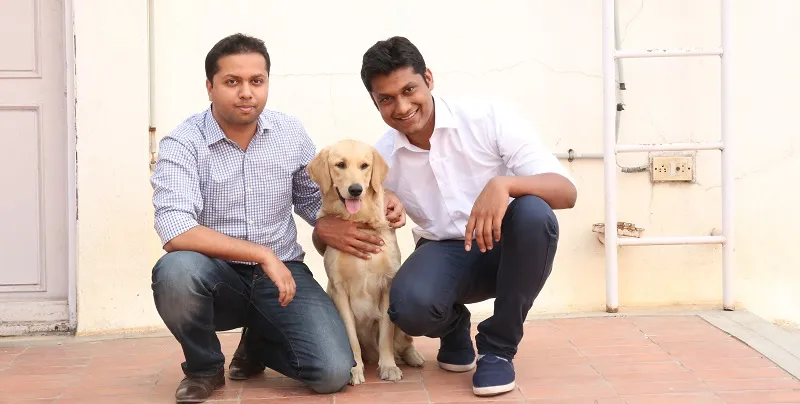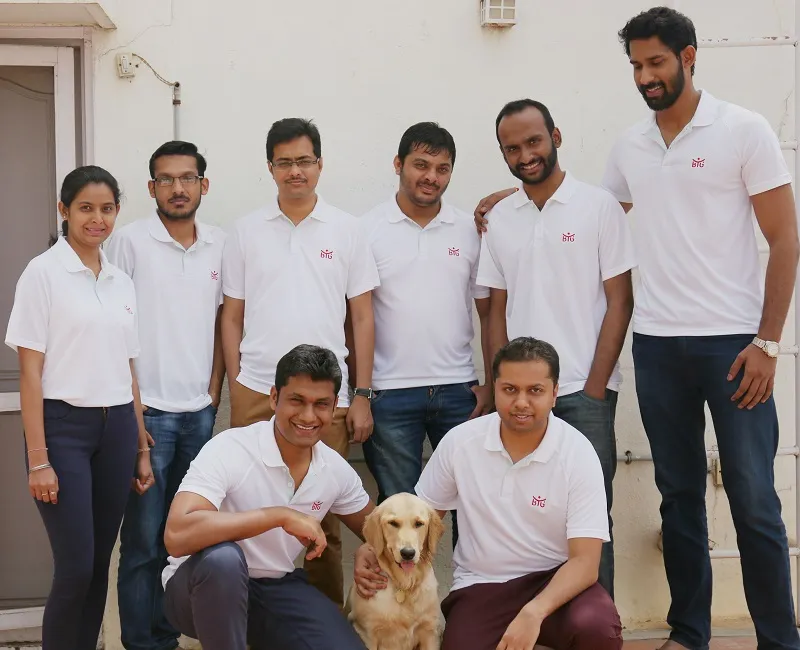With 782 centres listed across 5 cities, this startup wants to make it BYG in the fitness space
Devi Prasad Biswal (28) calls himself the aggressive ‘operations’ guy, while Avijeet Alagathi (28) is the ‘calculated’ risk taker. Their camaraderie dates back to 2011 when these management graduates (from MDI Gurgaon and IIM Kozikode) joined Goldman Sachs. Come 2014 and life took a slight turn for Devi when he joined his batchmates high street fashion startup Candidly Couture (CC) as operations head.

He stayed in touch with Avijeet (fondly called Avi), as he invested in Candidly Couture.
By 2015, the entrepreneurial bug was gnawing at Devi to startup. His idea came from the most unconventional place – a gym. Devi’s then flatmate wanted to join Bangalore’s Gold’s Gym for three months and was charged as much as Devi was paying for the whole year. To the entrepreneur’s surprise, the gym was almost empty and the prices didn’t make sense.
Devi dug deeper and realised that fitness centres were a mismanaged business lacking optimum utilisation. According to him, most gyms are usually fully utilised for four hours a day but are open for 17 hours. Moreover, only 15- 20 per cent of the customers renewed their membership with the fitness penetration in India being 0.4 per cent, which is the lowest in Asia.
Armed with this knowledge, Devi approached Avi with the idea to launch the Book Your Game (BYG) app on January 31, 2016.
Aiming to make it BYG
Currently available only on the Android Play Store, BYG allows consumers to book their fitness sessions at an adjusted price. Through the BYG app, one can buy gym memberships or choose fitness sessions in one’s locality, and pay per session with the ‘Workout Now’ option. The ‘Workout Now’ option proposes dynamic pricing from Rs 20-300 for a session. The company is also looking to launch their iOS version of the app this week.
Coupled with gyms, the app also allows consumers to book group sessions like Yoga, Zumba, Crossfit, Martial Arts,. and sporting activities like swimming, skating, and Kids Zone, which offers sports coaching and summer classes. As of now, 30 per cent of the consumers on the platform are subscribing to these group sessions.
BYG is also planning to introduce sports coaches and freelance personal trainers onto the platform over the next three months. This allows freelance fitness experts to go to different centers and train members.
Further, with plans to become consultants, the firm has also launched its CRM solution for gyms called Pulse. This will offer deep insights to the gym on the number of members at the gym, preferred workouts, repeat customers, etc.; Avi says such a solution is not currently available in this ecosystem. Moreover, the solution will also help gyms with member management, schedule management, lead generation, employee management in addition to deploying analytics on the ground.
This solution is strictly mobile since the co-founders felt that most gyms rarely use desktops. (50 fitness centres have already started paying for the solution while the rest will start paying by April).

Chasing the Metrics
Targeting audiences aged 10 - 65, the firm is operational in five cities including New Delhi, Mumbai, Pune, Bangalore and Bhubaneshwar. When why they chose a Tier 2 city, the duo reply saying that in Tier 2 cities, people have more discretionary cash to spend on fitness but aren’t aware about the availability of these facilities. Also, Tier 2 towns have less resources and infrastructure.
This also aligns with their plan to provide information such as cost and demand to new fitness businesses that are planning to open in Tier 2 cities.
Having tied up with more than 780 fitness centres, the firm has clocked almost 3,030 transactions in the first 40 days of starting operations. Every day, the platform is adding 10 centres while closing almost 150 transactions across locations. With 99 per cent of their audiences going for fitness classes, 80 per cent of them have made two or more transactions. All this with zero funds invested in marketing.
The BYG app has 4,500 downloads with 1,700 users making active transactions.
In the next six months, the firm is aiming for 2,000 fitness centers on the platform followed by 10,000 freelance trainers, while catering to 2 lakh customers.
On the revenue front, BYG charges 20 per cent commission from the service provider on every transaction. As of now, the app is free and the platform doesn’t charge the customer anything. For their B2B CRM solution, the firm is charging trial fees of Rs 1,000. This will increase to Rs 3,000 once the fitness centres start full subscriptions to their solutions.
Their turnover from gyms and customers combined has been slightly less than Rs 1 lakh in the first month of their launch, and they expect to reach Rs 25 lakh in cash revenue per month by August 2016. The firm is also raising an angel round of close to Rs 2 crore and is optimistic about closing a Series A before the end of this year.
Running into the future
In the coming five months, the firm is working to improve the Pulse platform, followed by introducing an events calendar listing all the fitness events happening in a city. On the consumer front, the firm is trying to solve the motivation problem. Devi tells us
“The success of fitness entities is completely based on consumer motivation.”
Therefore, in the coming months, the platform is trying to organise fitness socials while introducing capabilities to match a client’s performance with others through leaderboards, and helping them find fitness buddies.
The longer vision according to the co-founders is maintaining the user profile of each consumer, tracking his or her health level and performance through integration with wearables.
Is it any different?
There are many adopters (raised $84 million in five rounds from 26 investors) of the US ClassPass model in India and the market is close to saturation. BYG competes with several of these like GymPik, which has a workout pass using which customers can workout in any of their partner fitness centers, or Playnlive, which is a discovery, classifieds, and transaction-based platform for booking fitness training from 9,000 facilities. There is also Gymer where users can pay on an hourly basis for sessions, with no upfront fees.
The larger of the two –GymPik – recently acquired FitnessPapa, which was providing the same services with its subscription card at Rs 999 month. Fitternity, which drove sales through classifieds and listings, is also in the fray.
All of them are trying to solve the same problem, but with a twist in their revenue models and commissions. Moreover, what can be a winner for BYG could be the presence of their mix of B2B and B2C offerings. This means that the firm facilitates fitness centres through the complete cycle right from acquiring a customer to managing his or her routine as well as maintaining the regular count (attendance) in the gym.
BYG’s B2B solution competes with India’s Connectpedia, which is an ERP management system for fitness centres.
What is surprising is that the boom of all these fitness startups began only in the last two years. Moreover, with so many of them crowding this space, it will be interesting to see how things will play out in the future in terms of acquisitions.







